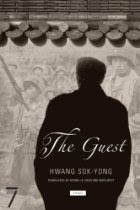
This review contains spoilers.
This novel, by a famous Korean author who suffered prison as a result of visiting North Korea, was created with the intent of healing fifty-plus years of deep and bloody wounds between North and South Korea that continue to mar an open dialogue between the two nations and even between family members. Interestingly the book is organized in twelve chapters that are modeled after a style of exorcism called Chinogwi (described briefly in the author’s introductory notes), which further demonstrates the book’s intent toward healing. The story follows Rev. Yosop [Yoseop] Ryu as he returns to his childhood village in North Korea and meets surviving relatives: his brother’s wife, a nephew and an uncle. Shortly before his departure from L.A., Ryu’s older brother, Yohan, dies. Once a leader of an anti-Communist militia in the North, Yohan’s ghost follows Yosop to North Korea, and the dreadful and violent secrets of a vicious and vindictive war are slowly revealed. Six months of this tumultuous time is played out a few in villages southwest of Pyongyang. The information feels accurate and stringently researched: the names and roles of various Communist groups and Christian groups are carefully described, battles and numbers of men, weapons and casualties are recounted. Hwang uses shifting points of view to tell these stories, including the memories of the ghosts that begin to crowd Rev. Yosop’s evenings as he delves further into the North’s countryside and reaches closer to home and the memories that challenged both his faith in humanity and in God.
Like some other translations of famed Korean novels, Westerners may have difficulty with certain conventions of culture and language that are integral in Korean writing. I’m not fluent in Korean, and I found myself having to pay careful attention to remember names and relationships, and I felt certain dramatic moments to be overwrought, as is not uncommon in the culture. There are sections of straight exposition about Korea’s history in the earlier part of the book that are probably important for many readers, but it also severs the narrative force of the story at that point.
I found the present-day attitudes about the past to be fascinating and enlightening. At one early part of Rev. Yohan’s trip to North Korea, he meets a fellow passenger and describes this encounter:
Stories of families being separated during the war were so common that hearing only a few lines for each case, like the quick report you might catch on a TV newscast, was almost always enough to get an idea of what happened. And yet, despite the overarching similarities, there was always something about hearing it firsthand, directly from the lips of the survivor, that tugged at your heart.
A similar statement was made by famed Korean writer Park Wan-suh, in her short story, “Weathered Blossom.” One character meeting another on a bus journey says that the shared past of the war has become so cliche, it’s pointless to recount one’s experience of it.
It interests me to hear the surviving generations’ attitudes toward the war, since it was such a common national experience whose effects are still reverberating, and yet something completely foreign to us Korean Americans born in the U.S., or Westerners. In that light, Hwang’s book does successfully work toward exposing what the particulars of that national experience were, and how the resentments were founded, built and festered, and also how pointless it is, and how impossible it is to linger on the past of confusion and hatred if the nation is truly to move toward healing.
No remuneration of any kind was received for this blog post.

1 comment:
Dear Eugenia (maybe?),
Excellent blog, if somewhat off the radar - I search for Korean Lit topics almost every day and just found you. You need to fire your agent!
I can't wait to fully check out all the books you've reviewed.
Charles..
Post a Comment